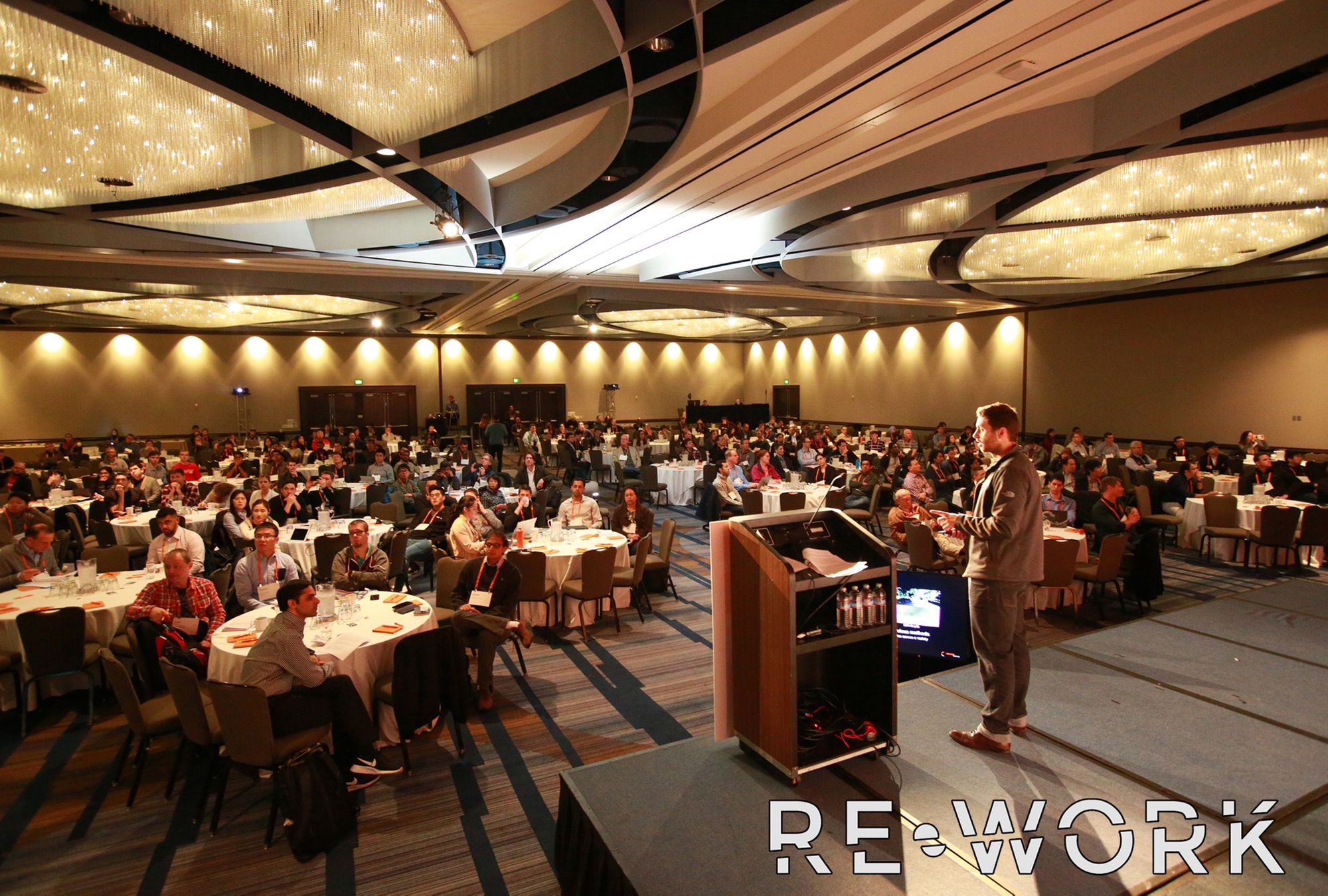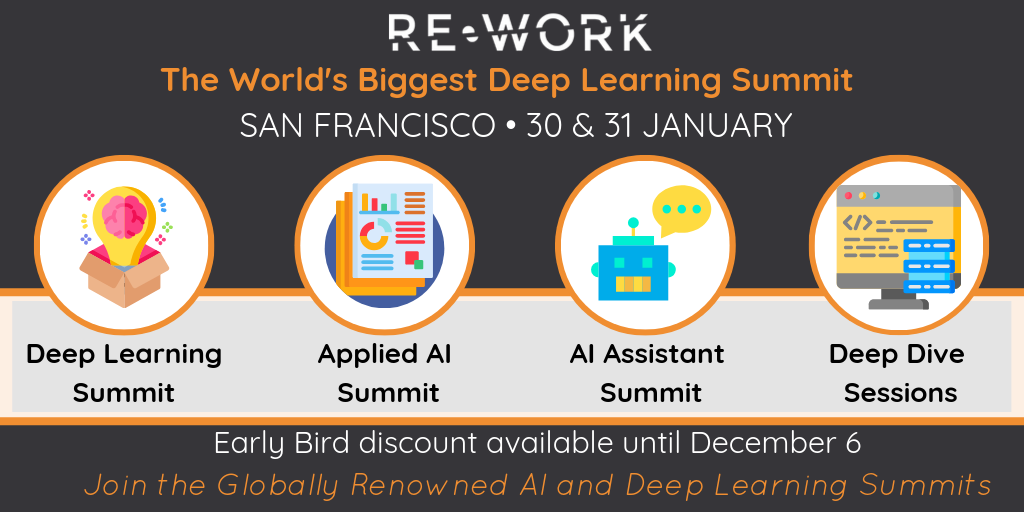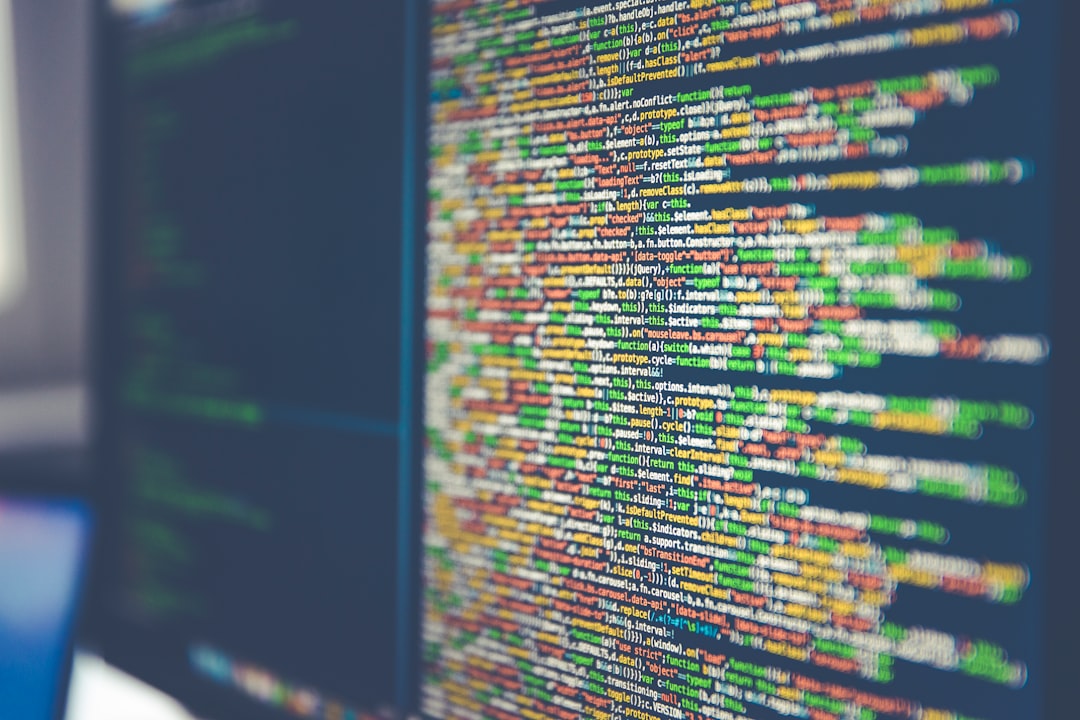For the 6th year running, the Deep Learning Summit is returning to San Francisco in January 2020, this time joined by the AI Assistant Summit, the Applied AI Summit and the Deep Dive Sessions. With one ticket, attendees will be able to access sessions from all rooms covering topics from Neural Networks, Robotics, NLP, Image Retrieval, Speech Recognition, Computer Vision, Business Case Studies, Chatbots, Ethics, Privacy & Security and more. 90 globally renowned speakers will be joined by 600+ attendees who are leading technologists and innovators in their fields. Across the two days there will be over 12 hours of networking over drinks and lunch sessions as well as the opportunity to attend the Women in AI Dinner.

We've already got some of the leading minds in AI and Deep Learning confirmed for the summit, so let's take a look at how the agenda is shaping up so far:
Deep Learning Summit:
Ken Goldberg
Presentation: A Radically Hopeful Vision for Humans, Artificial Intelligence, and Robots
Ken Goldberg is an artist, inventor, and roboticist. He is William S. Floyd Jr Distinguished Chair in Engineering at UC Berkeley and Chief Scientist at Ambidextrous Robotics. Ken is on the Editorial Board of the journal Science Robotics, served as Chair of the Industrial Engineering and Operations Research Department, and co-founded the IEEE Transactions on Automation Science and Engineering. At the summit, his presentation will focus on "Automation Anxiety" and will hone in on the question "Are AI and Robots an existential threat to humans?". The talk will be presented in 3 parts; 1) What Isn’t New, 2) What Is New, and 3), How We Can Prepare. Ken will share results from his research in robotics and their recent global study suggesting how AI and robots could lead to a more productive and inclusive future for humans.
Lex Fridman, AI Researcher, MIT
Deep Dive: An Introduction to Reinforcement Learning
Lex Fridman is a researcher at MIT, working on deep learning approaches in the context of semi-autonomous vehicles, human sensing, personal robotics, and more generally human-centered artificial intelligence systems. He is particularly interested in understanding human behavior in the context of human-robot collaboration, and engineering learning-based methods that enrich that collaboration. Before joining MIT, Lex was at Google working on machine learning for large-scale behavior-based authentication. Lex also hosts the increasingly popular Artificial Intelligence podcast.
In this session, Lex will break down some of the intricacies of deep learning and reinforcement learning and will explore the ways in which the two can be combined to improve results.
Daphne Koller, CEO, insitro
Presentation: Machine Learning: A New Approach to Drug Discovery
We're really excited to have Daphne returning to the Summit this year, following her appearance in 2018 where she spoke about her work at Calico, as well as women in AI in a fireside chat. In next year's presentation, she will explain how modern medicine has given us effective tools to treat some of the most significant and burdensome diseases, but at the same time, it is becoming consistently more challenging to develop new therapeutics. In this talk, Daphne will share how she believes that, it is possible to develop machine learning models to help predict the outcome of clinical trials and other experiments, and that those models, while inevitably imperfect, can outperform predictions based on traditional heuristics. The key will be to train powerful ML techniques on sufficient amounts of high-quality, relevant data. To achieve this goal, she is bringing together cutting edge methods in functional genomics and lab automation to build a bio-data factory that can produce relevant biological data at scale, allowing us to create large, high-quality datasets that enable the development of novel ML models.
You can watch Daphne's fireside chat from the Deep Learning Summit, 2018 here.
AI Assistant Summit:
Nikko Ström, Senior Principal Scientist, Alexa AI
Nikko Ström is a technologist and scientist with a deep background in speech technologies. He joined Amazon in 2011 as a Senior Principal Scientist and was a founding member of the team that built Amazon Echo and Alexa. In this role, he leads deep learning efforts and machine learning projects across the Alexa organization.
Nikko has more than twenty years of experience in the field of Automatic Speech Recognition from a few of the most prominent research laboratories and companies in the world, and has published extensively at international conferences, journals, patents, and books. He has worked as a research scientist at the MIT Lab for Computer Science and a speech scientist at the start-up company Tellme Networks in 2000, and in 2007 he transitioned to the Core Speech Recognition Team at Microsoft, pushing the limits of the state of the art in commercial speech recognition technology in collaboration with the Microsoft Research Speech group.
Sadid Hasan Senior Scientist, Philips Research
Presentation: A Domain Knowledge-Enhanced Deep Learning Model for Disease Named Entity Recognition
Disease named entity recognition (NER) is a critical task for most biomedical natural language processing (NLP) applications. For example, extracting diseases from clinical trial text can be helpful for patient profiling and other downstream applications such as matching clinical trials to eligible patients. Similarly, disease annotation in biomedical articles can help information search engines to accurately index them such that clinicians can easily find relevant articles to enhance their knowledge. In this talk, I will discuss about our recently proposed domain knowledge-enhanced long short-term memory network-conditional random field (LSTM-CRF) model for disease named entity recognition, which also augments a character-level convolutional neural network (CNN) and a character-level LSTM network for input embedding. Experimental results demonstrate that our proposed model achieves new state-of-the-art results in disease named entity recognition on a scientific article dataset.ge caption generation.

Applied AI Summit:
Kay Firth-Butterfield, Head of AI & ML, World Economic Forum
Kay is the Head, Artificial Intelligence and Machine Learning, at the Center for the Fourth Industrial Revolution at the World Economic Forum. Prior to taking this position I was Executive Director of AI-Global and led the Ethics Advisory Panel of Lucid.ai.I have worked for the past three decades as a barrister, mediator, arbitrator, business owner, professor and judge in the United Kingdom. In the United States, I have taught at the undergraduate and law school levels and worked as a professional lecturer. I am a humanitarian with a strong sense of social justice and have advanced degrees in Law and International Relations. In my role as Chief officer of the EAP I have advised governments, think tanks and non-profits about artificial intelligence. I am co-founder of the Consortium for Law and Policy of Artificial Intelligence and Robotics at the Robert E. Strauss Center, University of Texas and teach a course at the UT Law School for the Consortium: "Artificial Intelligence and emerging technologies: Law and Policy". Additionally, I am a Distinguished Scholar of the Robert E Strauss Center at the University of Texas and Vice Chair of the IEEE Industry Connections "Global Initiative for Ethical Considerations in the Design of Autonomous Systems.
Venu Vasudevan, Research Director, Data Science & AI at Procter & Gamble
Presentation: The AI Impact on Daily Touch Products
Venu is a technology leader with a track record of successful consumer & enterprise innovation at the intersection of AI, Machine Learning, Big Data, and IoT. He was a founding member of the Motorola team that created the Zigbee IoT standard, worked to create a zero-click interface for mobile, created an industry first Google Glass experience for TV, an ARRIS video analytics and big data platform recently acquired by Comcast, and a social analytics platform leveraging Twitter that was featured in Wired Magazine and BBC. Venu holds a PhD (Databases & AI) from The Ohio State University, and was a member of Motorola’s Science Advisory Board (top 2% of Motorola technologists). He is an Adjunct Professor at Rice University’s Electrical and Computer Engineering department, and was a mentor at Chicago’s 1871 startup incubator.
Still not sure if the Deep Learning Summit is right for you? Take a look at more highlights from previous editions of the summits here:
